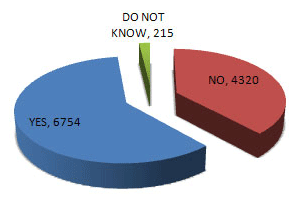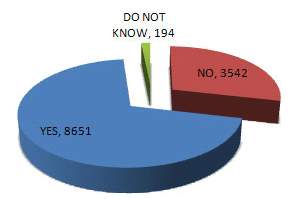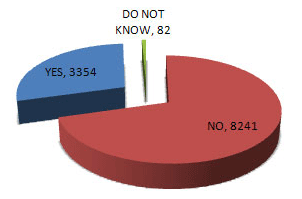You are here
- Resolve Kashmir through UN, not through Composite dialogues: Nawa-e-Waqt
- The Balochistan Package: Involve Baloch leaders in discussion: Khabrein
- Stop India’s Cultural aggression, demands Ausaf daily
- Corruption in Pakistan: Dismiss corrupt Ministers, advises Hamid Mir
- Pakistan Pulse
- No one would be allowed to change the official name of Pakistan: Nawa-e-Waqt
- Pakistan will disintegrate, if 1973 Constitution is disturbed: Jasart
Nawa-e-Waqt, Editorial, November 16, 2009
Resolve Kashmir through UN, not through Composite dialogues: Nawa-e-Waqt
Commenting on the adoption of a resolution on Kashmir in one of the UN Committees, the Nawa-e-Waqt Urdu daily in its editorial says that “after a long gap Pakistan has raised Kashmir issue at the UN”. It says that “if Pakistan shows courage and vigorously pushes this agenda with the help of the OIC, NAM and compels the US, UK and its allies to cooperate with Pakistan on the issue, the resolution could be accepted by the UN General Assembly also.” The daily suggests, instead of talking of resuming the composite dialogue process with India, Pakistan should bring the Kashmir issue to the UN and other international fora. It argues that, after getting the resolution on Kashmir approved by the UNGA the Pakistani leadership should convince the US and the UK to compel India to conduct a referendum in Kashmir.
The daily reminds President Zardari of the statement made by Zulfiqar Ali Bhutto that Pakistan would fight a war with India for a thousand years and notes that the solution to Kashmir according to UN resolutions would be a test of “his loyalty to Zulfiqar Ali Bhutto and Benazir Bhutto.”
(http://www.nawaiwaqt.com.pk/pakistan-news-newspaper-daily-urdu-online/Opinions/Editorials/16-Nov-2009/6061)
Khabrein, Editorial, November 18, 2009
The Balochistan Package: Involve Baloch leaders in discussion: Khabrein
The current government’s step to redress the problems of Balochistan is appreciable, writes Khabrein Urdu daily in its editorial. Commenting upon the approval of the “Aghaze Huqooq-e-Balochistan” (Beginning of Rights of Balochistan) package, the daily says that the step suggests that the “government realizes the sensitivity of the issue.”
However, the daily says that it is undeniable that after the creation of Pakistan no government paid attention to the development of Balochistan. As a result problems and complaints of the Baloch people repeatedly surfaced, leading to the emergence of at least three rebellious movements which were suppressed with the help of the army. This could be a probable reason for Shahzeen Bugti, leader of the Jamhuri Watan Party’s non-acceptance of the package if the army is involved in the process. The rebellious mood among the Baloch is reflected in the formation of the Balochistan Liberation Army who have been involved in various destructive activities. The editorial also notes “the remarks by Brahmdar Bugti that they will approach the US and India for help to liberate Balochistan. These remarks only remind us of the sense of deprivation of Baloch leaders feel that they are demanding freedom.”
The editorial notes that a commission consisting of Chaudhary Shujaat Hussein and Murshahid Hussein was constituted during the Musharraf regime which presented a 15 point proposal to the Baloch, but none of them were implemented which has also aggravated the sense of deprivation among the Baloch people.
The paper in this context suggests the government’s “need of the hour is to implement the package forthwith, otherwise the situation in Balochistan will get out of control”. Since the government is in the process of discussing the Balochistan package, it should not limit the discussion to elected representatives from Balochistan but should also involve Baloch leaders such as Brahmdar Bugti, Shahzeen Bugti, Jameel Akbar Bugti, and BLA leaders. A unilateral decision on the package will yield no result.
The paper also suggests that after taking the Baloch leaders into confidence Pakistan should “wipe out Indian agents active in Balochistan and should ask the US to tell India not to intervene in Balochistan’s affairs.”
(http://www.khabrain.com/idaria_detail.aspx?id=1) (Accessed on November 18, 2009)
Ausaf, Editorial, November 18, 2009
Stop India’s Cultural aggression, demands Ausaf daily
The Pakistani Senate’s Standing Committtee on Information and Broadcasting has taken notice of the promotion of Indian culture through satellite channels in Pakistan and observed that some of the Pakistani women have started sporting “Bindya” on their forehead, writes an editorial in the Ausaf Urdu Daily. The editorial opines that Indian entertainment channels and Cable Operators are telecasting movies which are generating adverse effect on morality among Pakistani youth. It is unfortunate that cable operators are telecasting films which promote hatred towards Pakistan and also Indian movies which depict the Indian army as more powerful than the Pakistani Army. Increasingly Pakistani children and youth are speaking Hindi. The editorial demands curbs on cable operators and Indian TV channels and says that if it is not done the ‘immoral’ Indian media will destroy our culture.
(http://www.dailyausaf.com/news/id/20669/)
Jang, Column, November 19, 2009
Corruption in Pakistan: Dismiss corrupt Ministers, advises Hamid Mir
According to a report by Amnesty International, corruption in Pakistan has increased five fold. Prime Minister Yousuf Raza Geelani, instead of rejecting the report, has constituted an enquiry committee which is a step in the right direction, writes Hamid Mir in a column in Jang Urdu daily.
He is of the view that for the existence of the country “corruption is as big a challenge as terrorism” and suggests that “for the political stability of the country, corrupt and inept ministers should be relieved”. He argues that “those ministers, who were inept in handling load shedding, failed to resolve the sugar crisis and those who failed to check the rise of terrorism in the country, should voluntarily resign from their ministries.” In a veiled reference to Hussein Haqqani, the Pakistani ambassador to the US, Mir suggests that “the diplomats who created misconception between the army and the political leadership should go to some other place that would be in national interest. If they do so, the entire nation would be thankful to them”. Mir suggests that, Zardari, Geelani, Nawaz Sharif, Imran Khan, Salim Akbar Bugti and Akhtar Mengal, “work together to make the nation self reliant.” He suggests that it is necessary to work in a united manner and if they jointly face foreign intervention, the country will get rid of all its problems in two to three years.
(http://www.jang.com.pk/jang/nov2009-daily/19-11-2009/col6.htm)
Pakistan Pulse: Online opinion Poll by Asas Urdu Daily
Q Can Balochistan Package help bring Peace in Pakistan? ( Poll conducted on 17 November, 2009)

A majority of 6754 respondents agreed that it will help achieve the purpose while 4320 people disagreed. 215 respondents had no opinion.
Q Whether Pakistani government has given its assent for the US intervention in the Country? (Poll Conducted on 14 November, 2009)

8651 people believed that the Pakistani government has given its nod to the US intervention in the country, while 3542 respondents disagreed. 194 respondents had no opinion on the issue.
Q Is the government sincere in prosecuting Musharraf ? (Poll Conducted on 11 November, 2009)

A majority of 8241 respondents doubted the government’s sincerity while a minority of 3354 respondents believed that the government is sincere. Only 82 respondents had no opinion.
Q Will Pak army achieve success in military operation? (Poll Conducted on 08 November, 2009)
A majority of the 9853 respondents’ reposed faith in the army. While a minority of 1478 respondents believed that the army will not achieve success. 137 respondents had no opinion.
(http://www.dailyasas.com.pk/poll_answer.html) accessed on November 19, 2009)
Nawa-e-Waqt, Editorial, November 20, 2009
No one would be allowed to change the official name of Pakistan: Nawa-e-Waqt
Awami Nationalist Party’s (ANP) proposal to the National Assembly’s Constitutional Reform Committee to change Pakistan’s name from the “Islamic Republic of Pakistan” to the People’s Republic of Pakistan has stirred a debate in the media. The Nawa-e-Waqt Urdu daily in its editorial writes that this proposal was presented by the ANP and is supported by the MQM. The editorial states that “it is not surprising that the ANP and MQM have agreed to a proposal to change Pakistan’s name. In fact they are following in the footsteps of their predecessors”. The editorial criticizes those who do not accept the two nation theory and says that “it is unfortunate that in the country there are elements who do not accept the two nation theory as the basis for the formation of Pakistan.” In a veiled reference to the MQM and the ANP the editorial says that “these elements think that the realization of Pakistan was aimed at liberating people from economic deprivation and also from Britain’s exploitative regime.” The editorial suggests that if this kind of proposal has been presented before the Constitutional Reform Committee, it should be categorically rejected and the committee should present an explanation to the nation in this regard and warns that “no one would be allowed to change the foundation of the nation.”
(http://www.nawaiwaqt.com.pk/pakistan-news-newspaper-daily-urdu-online/Opinions/Editorials/20-Nov-2009/6170)
Jasarat, Editorial, November 20, 2009
Pakistan will disintegrate, if 1973 Constitution is disturbed: Jasart
The Jasarat daily, on the other hand termed it “an onslaught on Pakistan’s image”. In its editorial the daily says that such an effort was made by General Ayub Khan but his consultants stopped him from doing that. The daily says that “under US guidance the MQM has made another attempt to change Pakistan’s image but it will be foiled this time also”. The editorial states that the 1973 Constitution is a unanimously accepted document and “if it is disturbed, Pakistan will disintegrate”
(http://www.jasarat.com/graphic/details.php?category=editorial&date=20-11-2009)
